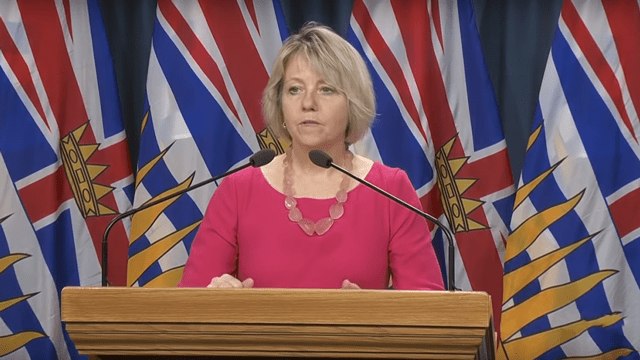
(Provincial Health Officer Bonnie Henry. APTN file)
An outbreak of COVID-19 in British Columbia’s Nass Valley has prompted an alert from the Northern and First Nations health authorities.
The warning goes out to anyone who attended gatherings between Aug. 21 and 25 in the valley. A statement from the Nisga’a government says all those who attended a memorial, funeral or settlement feast need to contact their community clinic.
A joint statement Tuesday from Health Minister Adrian Dix and provincial health officer Dr. Bonnie Henry says there have been 58 new cases of COVID-19 for a total of 5,848 cases.
There has been one additional death, while 4,505 people who tested positive have recovered. Since the pandemic began, 209 people have died.
The government also announced it is extending the provincial state of emergency until the end of the day on Sept. 15, which allows Public Safety Minister Mike Farnworth to use extraordinary powers in response to the pandemic.
Premier John Horgan says in a statement that while the majority of people are following rules to stop the spread of COVID-19, a small number are ignoring orders.
“This pandemic is not over, and whether it’s an end-of-summer gathering or hockey celebration, this is not the time to bend or break the rules. To those few who are not complying, there will be consequences.”
$2,000 tickets
Ten tickets have been issued since the government gave authorities the ability to issue $2,000 tickets for violating the provincial health officer’s orders on gatherings, the statement says.
Six of those were for $2,000 related to gatherings and events, while four were issued to individuals for $200 each.
Dix says the province is almost back to its regular timelines for surgery after completing about 66 per cent of the more than 17,000 procedures that were postponed at the start of the pandemic.
The government says in a news release that it’s working with staff, unions and others to determine the best way to extend daily hours and open operating rooms on the weekends.
The government has hired more anesthesiologists, nurses and medical technicians to help accelerate the process.
Dix says that’s why it’s so important to keep the infection rate low.
“Right now, perhaps more than at any other time in our B.C. pandemic, we’re counting on each other to stop the spread of COVID-19,” he says in the release.
“And the remarkable British Columbians involved in surgical renewal and getting patients the surgeries they need are counting on us to do our work, so they can continue to do theirs.”










